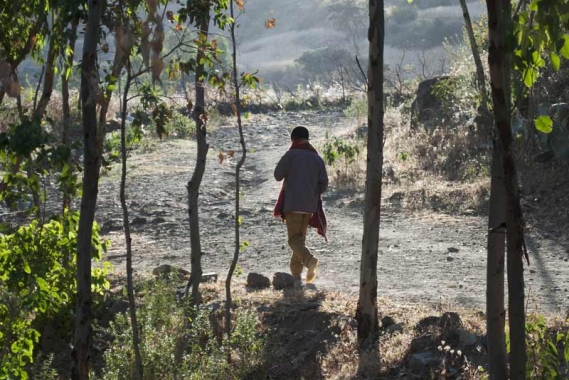When the Child Must be the Parent

Aman’s* life is different compared to most teenagers in Jimma, south-western Ethiopia. He has no time for friends or for himself, he is too busy being a parent, taking care of his sick father and two brothers aged 10 and 14 years old.
Aman says he feels isolated and trapped by the responsibilities of parenthood, “I am under constant pressure to watch my father because he is always depressed and tearful. I also have to make sure he takes all his medication, the anti- depressants and anti-retroviral drugs. Looking after my family has become my way of life. I have to do household chores, prepare meals for my brothers and manage my father. This is too much for me to handle,” he says.
Aman is in grade 10 at a local high school, but, not surprisingly, he does not always make it to class. Sometimes he is locked out for lack of school fees, other times he is just too hungry to attend. He is now finding it difficult to keep up with school work, and his self-esteem has crumbled.
The 16-year-old now feels bitter and angry.
“I quarrel with my brothers a lot because I have lost patience with them. There is no peace in this home,” he says. “I also find it difficult to relate with people, even those my age. I am lonely, I have no friends.”
It is not uncommon to find child headed households in Ethiopia. Children as young as 9 years old are left to care for their siblings. Although figures showing the extent of the problem are not readily available, the African Child policy Forum says there were an estimated 77,000 unaccompanied child-headed families in Ethiopia, in 2005.
Most of these homes have come about after the death of parents due to HIV/AIDS, due to poverty, parental separation, or the inability of a parent to meet the needs of the family. Like Aman, these children lead very stressful lives, as they have not developed the coping mechanisms to deal with the challenges they are facing.
“My father is always fighting, he shouts and screams at us,” says Aman. “He also gets into brawls with our neighbors. We are not even able to study at night because he makes a lot of noise. Sometimes he refuses to take his medication, and without them his condition gets worse. We are living in fear. We feel better when we go to school because the environment there is better, it helps us feel free and safe,” he says.
The family largely survives on 300 Ethiopian Birr, (18 Canadian dollars) per month, money collected from rental income. When it runs out, which regularly happens, the boys and their father stay hungry. On rare occasions a brave neighbor brings them bread.
“I fear for the safety of my brothers and the health of my father. He used to take care of us before he got sick, he was there for us after my mother died. But we now have to take care of him. I really like school but I can’t keep going there because I find it hard to concentrate, all I think about is my family’s problems. I would like to help my brothers and my father but I do not know how to make a difference.”
“I feel so awful when I lay down to sleep,” Aman adds. “All I think about is what we will eat tomorrow. I only hope for a better day. I also worry about the fate of my family, I wonder when we will have enough food and a peaceful life.”
When situations like this occur, where children are put at-risk by parents who are unable to care and provide the support that their children they need, and deserve, SOS Children’s Villages works with the families and local communities to find the best possible solution for the children. Wherever possible, SOS supports the family, providing food, health care, and education, and counselling services to strengthen the capacities of parents and caregivers to provide for their children. When that is no longer a viable option, and children’s welfare is at-risk, alternative care, like an SOS family, is offered, to ensure that the children are able to grow up in a safe and loving environment, based on the best interests of the child.
*Named changed to protect the privacy of the child.
